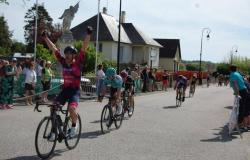Asthma is a chronic respiratory disease due to permanent inflammation of the bronchi. Sleeshness, cough, feeling of oppression in the chest … The asthma crisis can occur in contact with an allergen or during physical effort. In the effort asthma, the crisis is indeed triggered by “Prolonged hyperventilation linked to effort which causes dehydration and cooling in the bronchi”, explains Ameli.fr.
According to a survey by the IFOP Institute in partnership with Sanofi, 46 % of asthmatics believe that asthma has a negative impact on the practice of a sport or physical activity. And even if 64 % of them consider the practice of physical activity necessary, 60 % of severe asthmatics see it as a challenge and 43 % as a source of anxiety. However, more than compatible with asthma, physical activity is even recommended when the disease is well controlled. “The practice of sport makes it possible to develop the pulmonary capacity of asthmatics and to strengthen respiratory muscles. It contributes to the right control of asthma and gradually increases tolerance to effort ”underlines the foundation of the breath.
Thus, the Gregory Pariente foundationwhich sensitizes asthmatic adolescents to the good observance of their treatment, highlights the journey of Alexandre Marchand, a 35 -year -old sportsman, asthmatic, who is about to take the start of the Ironman des Sables d’Olonne on June 22. 3.8 km of swimming, 180.2 km of cycling and 42,195 km of running. Objective ? “Show asthmatics and especially young people that they can touch the extraordinary, even by being asthmatic. »»
Three golden rules to be respected
Asthma should therefore not be an obstacle to the practice of physical activity, even at a high level. However, it is essential to observe certain rules in order to practice safely. Thus, the Gregory Pariente Foundation considers that three conditions must be met to do sports in complete safety:
1 – Prepare the breath: the use of a bronchodilator 10 to 15 minutes before exercise, then according to the needs during the intense effort as well as a complete warm -up is essential to prepare the airways and avoid bronchoconstriction. Learning and implementing suitable breathing techniques contribute, depending on the foundation, to optimize breath control.
2 – Cardio and Inseparable Endurance: Cardio -respiratory training improves body capacity to effectively use oxygen (VO2max). A solid aerobic endurance is the key because it allows to maintain a constant effort over very long distance without premature exhaustion. Respect for recovery times is essential to prevent and manage fatigue linked to prolonged effort.
3 – A suitable practice and medical follow -up Optimal: sports practice must be adapted according to climatic conditions. A peak of pollution, humidity, cold and dry air can indeed cause an asthma attack. Regular and appropriate hydration before, during and after effort also contributes to safety and performance. Finally, medical follow -up and personalized advice must be integrated to adjust training.
Source: Ameli.fr, Gregory Pariente Foundation, Ifop, La Foundation du Souffle








